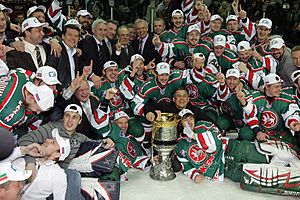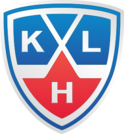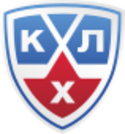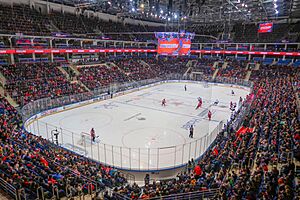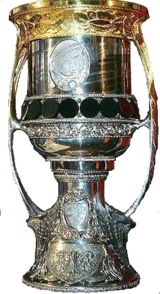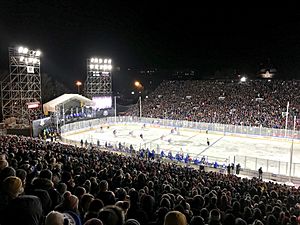Kontinental Hockey League facts for kids
 |
|
| Formerly | Russian Superleague (RSL) |
|---|---|
| Game | Hockey |
| Founded | 2008 |
| President | Alexei Morozov |
| Motto | Хоккей – наша игра! (Hockey is our game!) Хакей – наша гульня! Хоккей – біздің ойын! 冰球,就是我们的生活! |
| No. of teams | 23 |
| Country |
|
| Most recent champion(s) |
Lokomotiv Yaroslavl (2nd title) |
| Most titles | HC CSKA Moscow Ak Bars Kazan Metallurg Magnitogorsk (3 titles each) |
| TV partner(s) |
KHL TV, KHL TV Prime (Russia (as part of the NTV Plus package), Russia and international through KHL's website) |
| Sponsor(s) | Fonbet |
| Related competitions |
|
The Kontinental Hockey League (KHL) is a professional ice hockey league in Eurasia that started in 2008. It has 23 teams from four countries: Russia, Belarus, Kazakhstan, and China.
The KHL is known as the best professional ice hockey league in Europe and Asia. Many people consider it the second-best in the world, right after the National Hockey League (NHL) in North America. At the end of every season, the teams compete in playoffs, and the winner gets a famous trophy called the Gagarin Cup. The best-ranked Russian team is also named the Champion of Russia.
Contents
History of the KHL
The KHL was created in 2008 to replace the Russian Superleague (RSL). It started with 24 teams, mostly from Russia, but also included teams from Belarus, Latvia, and Kazakhstan.
A very sad event happened on September 7, 2011. A plane carrying the Lokomotiv Yaroslavl team crashed, and almost everyone on board died. The league was shocked, and a game that was being played was stopped immediately. For many years, the KHL did not schedule any games on September 7 to remember the team.
In 2022, after the conflict in Ukraine began, the NHL stopped its official agreement with the KHL. This changed how the two leagues worked together.
How Teams Have Changed
Over the years, teams have joined and left the KHL. At first, the league was mostly made up of teams from countries that were part of the former Soviet Union.
From 2011, the league expanded into other parts of Europe. Teams from Slovakia, the Czech Republic, and Croatia joined. In 2014, Jokerit, a team from Helsinki, Finland, also became part of the KHL.
More recently, some teams have left the league. For example, Jokerit from Finland and Dinamo Riga from Latvia left in 2022. However, the league has also welcomed back old teams, like HC Lada Togliatti in 2023.
How the KHL Season Works
The KHL is split into two groups, called conferences: the Western Conference and the Eastern Conference. Each conference has two smaller groups called divisions.
Regular Season
During the regular season, each team plays 62 games. They play several games against teams in their own division and conference, and a few games against teams from the other conference. Teams earn points for winning games.
Playoffs and the Gagarin Cup
After the regular season, the top eight teams from each conference go to the playoffs. This is a tournament to decide the league champion.
In the playoffs, teams play a "best-of-seven" series. This means the first team to win four games moves on to the next round. The winners of each conference final then play against each other for the Gagarin Cup.
For teams that don't make the playoffs, there used to be a special tournament called the Nadezhda Cup (Cup of Hope). This gave them more games to play and a chance to win a prize.
KHL Teams
The KHL has teams spread across a huge area, from Eastern Europe to the far east of Asia. The maps below show where the teams are located.
Players in the KHL
Players in the KHL come from all over the world. While most players are from Russia, many also come from other European countries and North America. The league has rules about how many foreign players each team can have. For Russian clubs, the limit is three foreign players.
The KHL and the NHL have an agreement to respect each other's player contracts. This means a player with a valid contract in one league cannot just leave to join a team in the other.
After the events in Ukraine in 2022, some players from outside Russia chose to leave their KHL teams. This included players from Finland, Sweden, Canada, and other countries.
Trophies and Awards
The KHL gives out several important trophies each year.
- Gagarin Cup: This is the biggest prize. It is awarded to the team that wins the playoffs.
- Continental Cup: This goes to the team that finishes the regular season with the most points.
- Conference Champion Cups: The winners of the Eastern and Western conference finals receive these cups.
- Opening Cup: This is awarded to the winner of the first game of the season. The game is usually between the two teams that played in the Gagarin Cup final the previous year.
The league also gives awards to the best players, such as the Most Valuable Player (MVP) for both the regular season and the playoffs.
KHL Champions by Season
This table shows the Gagarin Cup winners, finalists, and top scorers for each season.
| Season | Teams | Final score | Continental Cup Winner | Top scorer | ||
|---|---|---|---|---|---|---|
| 2008–09 | 24 | Ak Bars Kazan | Lokomotiv Yaroslavl | 4–3 | Salavat Yulaev Ufa (129 points) | Sergei Mozyakin (76 points) |
| 2009–10 | 24 | Ak Bars Kazan | HC MVD | 4–3 | Salavat Yulaev Ufa (129 points) | Sergei Mozyakin (66 points) |
| 2010–11 | 23 | Salavat Yulaev Ufa | Atlant Moscow Oblast | 4–1 | Avangard Omsk (118 points) | Alexander Radulov (80 points) |
| 2011–12 | 23 | Dynamo Moscow | Avangard Omsk | 4–3 | Traktor Chelyabinsk (114 points) | Alexander Radulov (63 points) |
| 2012–13 | 26 | Dynamo Moscow | Traktor Chelyabinsk | 4–2 | SKA Saint Petersburg (115 points) | Sergei Mozyakin (76 points) |
| 2013–14 | 28 | Metallurg Magnitogorsk | HC Lev Praha | 4–3 | Dynamo Moscow (115 points) | Sergei Mozyakin (73 points) |
| 2014–15 | 28 | SKA Saint Petersburg | Ak Bars Kazan | 4–1 | CSKA Moscow (139 points) | Alexander Radulov (71 points) |
| 2015–16 | 28 | Metallurg Magnitogorsk | CSKA Moscow | 4–3 | CSKA Moscow (127 points) | Sergei Mozyakin (67 points) |
| 2016–17 | 29 | SKA Saint Petersburg | Metallurg Magnitogorsk | 4–1 | CSKA Moscow (137 points) | Sergei Mozyakin (85 points) |
| 2017–18 | 27 | Ak Bars Kazan | CSKA Moscow | 4–1 | SKA Saint Petersburg (138 points) | Ilya Kovalchuk (63 points) |
| 2018–19 | 25 | CSKA Moscow | Avangard Omsk | 4–0 | CSKA Moscow (106 points) | Nikita Gusev (82 points) |
| 2019–20 | 24 | Cancelled due to the COVID-19 pandemic | CSKA Moscow (94 points) | Vadim Shipachyov (65 points) | ||
| 2020–21 | 23 | Avangard Omsk | CSKA Moscow | 4–2 | CSKA Moscow (91 points) | Vadim Shipachyov (66 points) |
| 2021–22 | 24 | CSKA Moscow | Metallurg Magnitogorsk | 4–3 | Not determined | Vadim Shipachyov (67 points) |
| 2022–23 | 22 | CSKA Moscow | Ak Bars Kazan | 4–3 | SKA Saint Petersburg (105 points) | Dmitrij Jaškin (62 points) |
| 2023–24 | 23 | Metallurg Magnitogorsk | Lokomotiv Yaroslavl | 4–0 | Dynamo Moscow (98 points) | Nikita Gusev (89 points) |
| 2024–25 | 23 | Lokomotiv Yaroslavl | Traktor Chelyabinsk | 4–1 | Lokomotiv Yaroslavl (102 points) | Josh Leivo (80 points) |
KHL All-Star Game
Every year, usually in January or February, the KHL holds an All-Star Game. This is a special event where the best players in the league show off their skills in a fun tournament. Instead of a single game, the players are grouped by their divisions and play against each other in fast-paced 3-on-3 matches.
Images for kids
-
A KHL game between HC Lev Praha and Lokomotiv Yaroslavl in Prague.
See also
 In Spanish: Liga Continental de Hockey para niños
In Spanish: Liga Continental de Hockey para niños
- Ice Hockey Federation of Russia
- List of Soviet and Russian ice hockey champions
- Asia League Ice Hockey
- Supreme Hockey League
| Preceded by Russian Superleague |
Kontinental Hockey League 2008—present |
Succeeded by none |
 | Lonnie Johnson |
 | Granville Woods |
 | Lewis Howard Latimer |
 | James West |


